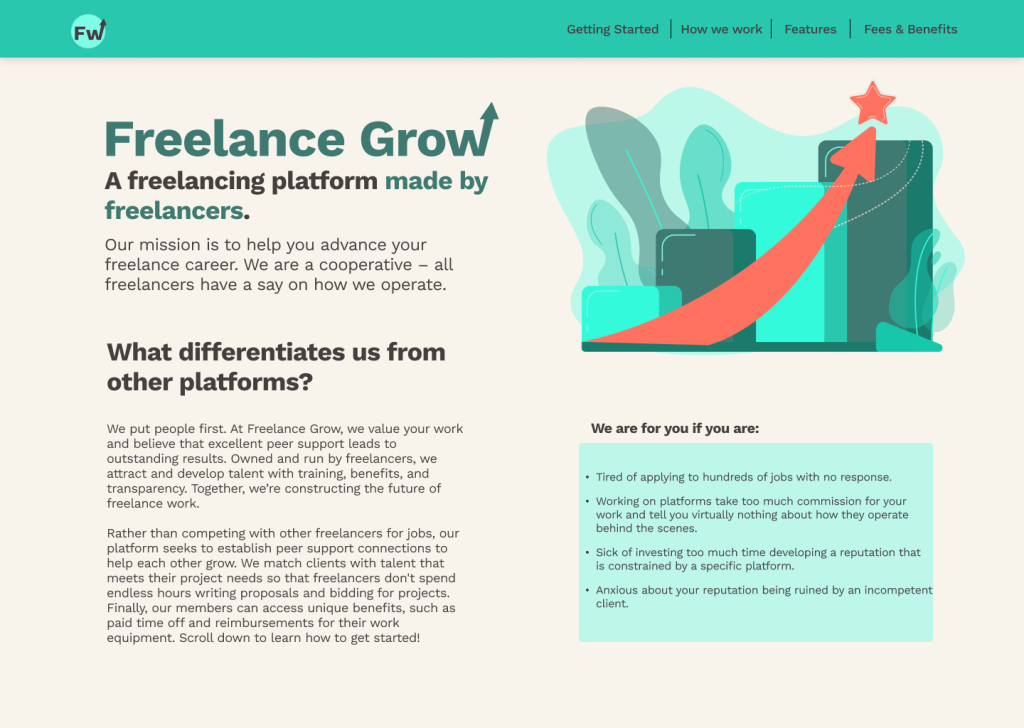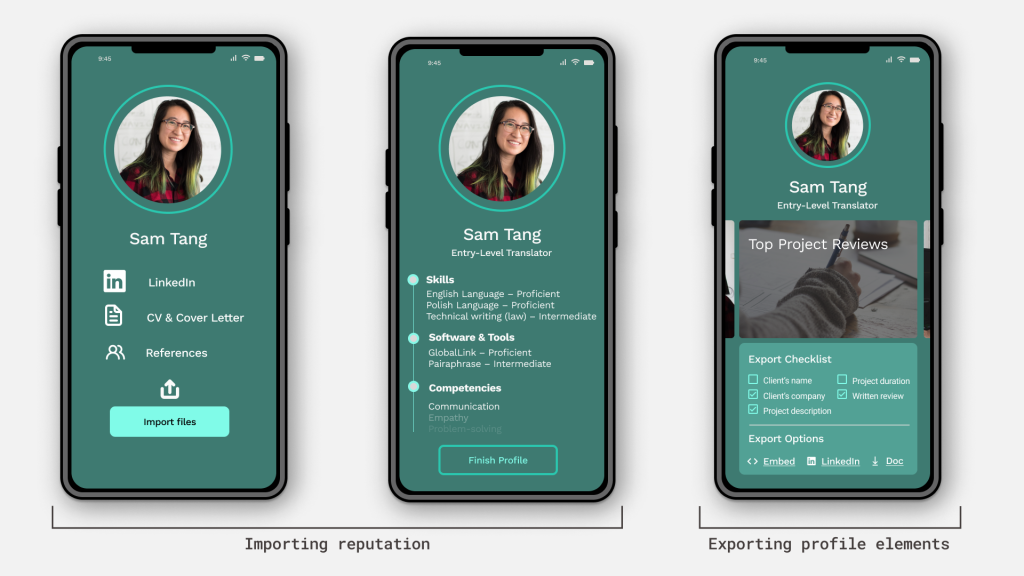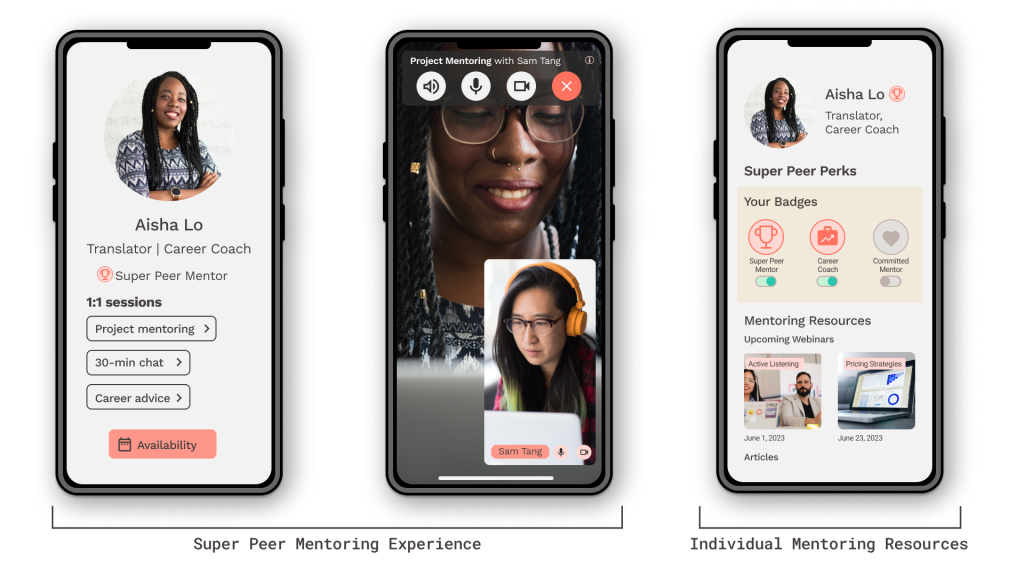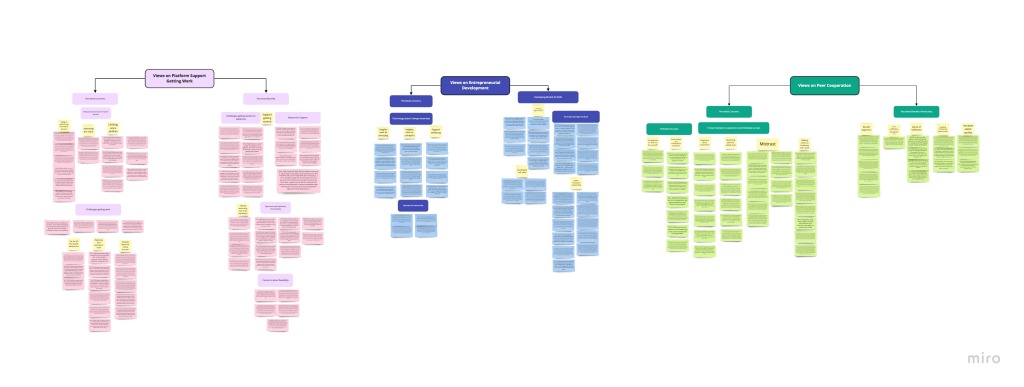Project Overview
Freelancing platforms, such as Upwork and Fiverr, have become a viable source of work for millions of freelancers worldwide. However, these platforms rarely prioritize freelancers’ professional development needs. In this project, I explore design opportunities to enhance freelancers’ professional development and peer support experiences on freelancing platforms.
This project received an academic award in 2022, and a longer paper has been published. I have expanded on the concepts I developed as part of this project to highlight my design process and skills.
| Roles | Team | Tools | Duration |
|---|---|---|---|
| Lead UX Researcher & Designer | Dr. Marta Cecchinato | Figma, Adobe Fresco, Zoom, Miro | 12 weeks |
| Project Manager | Dr. John Rooksby | HTML, CSS, JavaScript |
Objective: Explore Professional Development Opportunities on Freelancing Platforms
How can we visualize potential platform features that put freelancers’ professional development at the heart of their designs?
To explore this question, I designed Freelance Grow, a fictional freelancing company whose mission is to support freelancers in advancing their careers through a new platform. I created this concept to imagine a model of online freelancing where the platform is designed to amplify freelancers’ preferences and career development.

Approach
Understanding the Problem Space
Our goal at this stage was to understand freelancers’ barriers to accessing professional development while freelancing on platforms.
We assessed existing sources, including our award-winning analysis of freelancing communities, academic papers, research reports, and real-world tools to understand freelancers’ professional development needs and challenges.
Based on our problem exploration phase, our initial assumptions were:
- Freelancers require different professional development support depending on their career stage.
- Freelancers use platforms to explore career opportunities, foster entrepreneurship, and develop new skills. However, platforms rarely support these forms of professional development.
- Freelancers piece together various forms of self-development and mentorship, resulting in time-consuming efforts and added work.
Problem Statement
Freelancers need tools that adjust to their different professional development expectations that are easy to access and manage.
Persona Development
We created two personas from our background research (which included fieldwork observations and assessing the sources above).

Sam Tang
She is a novice freelancer with less than three months of experience.
Professional Goals
- Make her freelance business a sustainable source of work.
- Develop her entrepreneurial skills.
Motivations
- She wants to own her business and not depend on a single employer.
- She wants more flexibility over how work fits into her everyday life.
Frustrations
- Getting clients on platforms as a novice freelancer is incredibly challenging.
- She feels isolated and frustrated with the lack of support she gets.

Aisha Lo
She is an experienced freelancer with over three years of experience.
Professional Goals
- Diversify her work sources.
- Branch out to more lucrative professional domains.
Motivations
- She wants to stop relying on her few recurrent clients.
- She wants to spend more time learning new technical skills that can give her a competitive edge.
Frustrations
- She feels that having a few regular clients from a single platform is risky.
- She wants guidance on what skills are worth developing.
Ideating Potential Solutions
In this second stage, we created low-fidelity sketches of potential features to address our identified challenges. We brainstormed possible platform features that directly addressed our persona’s goals and mitigated their frustrations. We came up with three concepts:
- An Apprenticeship Program that supported newcomers like Sam to ease into freelance work.
- A Portable Reputation feature that helped freelancers like Aisha quickly diversify their work sources.
- A Super Peer Mentorship program that connected freelancers with similar interests and fostered supportive professional relationships.

Refining Concepts
Once we had a solid idea of our concepts and how they connected with freelancers’ needs, we ran a brainstorming session with UX experts from various disciplines, such as design, engineering, and research. This session uncovered different pain points and elements that needed more exploration before testing our concepts with real users. For example, some questions that were raised included:
- What happens with freelancers that are already experienced? Would they also go through an apprenticeship period?
- What potential barriers exist to designing a portable reputation? Wouldn’t this hurt the platforms’ business model?
- What incentives do freelancers have to become mentors?
I discussed this feedback with my collaborators. We brainstormed other ideas that considered these issues.
Balancing Conflicting Needs
A challenge we faced here was balancing platforms’ business goals with freelancers’ needs. For example, consider how allowing freelancers to export their profiles might hurt platform revenue or how a meaningful apprenticeship program might be designed. Since this project was exploratory in nature, meaning that no concrete solution was needed, we decided to move forward and test our perceived barriers from the freelancers’ standpoint.
Testing our Concepts
Insight-Driven Wireframes
Our concepts addressed the needs that emerged during the exploratory research phase.
The Apprenticeship Program offers support for novice freelancers while allowing more experienced freelancers to skip this step if they prefer to. This apprenticeship period also enables novice freelancers to explore whether self-employment is a good fit.
The Portable Reputation feature allows freelancers to easily import their reputations from various sources, such as LinkedIn. In addition, we explore how freelancers’ profile elements that could be shareable and useful to diversify freelancers’ work sources.

The Super Peer Mentorship program explores ways for novice and experienced freelancers to meet up and exchange support. Mentors were incentivized by lowering their fees, training materials, and special badges.

Focus Groups
We conducted four online focus groups, asking freelancers to look carefully at our concepts. The discussion centered on three main elements:
- Freelancers’ perceptions about our concepts, particularly any positive impact these features could have on their work experience.
- Any perceived concerns about our designs, especially elements that could hinder the freelancing experience.
- Potential barriers to realizing our concepts.
Freelancers received our concepts before the session and then had time at the session to look at them again. During the discussion, they were encouraged to have the concepts handy for a more detailed discussion.
Generating Insights
The focus groups were video and audio recorded on zoom for later analysis. The research focus on generating design opportunities for professional development and peer support was the analysis’s guardrails. I used a Miro board to thematically group insights from the discussion.

Insights & Takeaways
The Apprenticeship Program feature was perceived positively by newcomers who felt that platforms needed more support to get started. For example, one participant mentioned:
“Other websites don’t offer such kind of things like, if you are a beginner, there is not an option where you can learn and here [in the concept] you can learn with some paid projects so I think it’s a good initiative”
A challenge to implementing this feature is designing a scalable and sustainable program that can realistically cope with many newcomers.
The Portable Reputation feature sparked a mixed discussion. On the one hand, there was a perceived opportunity to leverage this feature for experienced freelancers to transition easily into platforms. As one participant mentioned: “Your non-freelancing work can somehow translate into like a beginning rating.”
On the other hand, there were concerns about the feasibility of this concept, questioning what platforms had to gain from letting freelancers transfer their portfolios between platforms. As voiced by one participant:
“Platforms compete with each other […] So if you want to transfer your profile from one platform to another, I think most platforms would like to uphold your reputation of your existing customers.”
Finally, participants viewed the Super Peer Mentorship feature as holding great potential for novice and experienced freelancers. Novices felt that working with a mentor could help them navigate the challenges of transitioning to freelance work. Experienced freelancers also saw value in mentoring peers as enabling a fulfilling experience and demonstrating their competence as a professional advantage. As one participant put it:
“if there is a small badge that shows I’m good enough that I can even mentor someone […] it’s an added advantage cos you are taking a time out to help someone else.”
A barrier we encountered was that freelancers might have competitive goals that could get in the way of mentoring others. For example, platforms incentivize freelancers to compete for contracts; this could hinder freelancers’ interest in supporting peers. One participant mentioned that it would be like “helping their competition.” More research is necessary to identify ways to incentivize cooperation in a competitive marketplace.
Takeaways
In sum, we found design opportunities for freelancing platforms to support freelancers’ professional development.
- This research validated a core assumption: freelancers require different professional development support depending on their career stage. Novice freelancers might need help getting started and securing work, while experienced freelancers might require support expanding their work sources.
- We uncovered that platforms are in a solid position to foster professional development and peer support, but these goals might conflict with their business model. These are significant barriers that might require re-imagining current freelancing platforms’ business models to embed professional development as part of their goals.
- Lastly, we found that both beginners and experienced freelancers could benefit from creating supportive connections. Platforms have an opportunity to facilitate these connections and ease the challenges of seeking mentorship. However, high levels of competition on platforms might hinder the creation of peer support.

Leave a comment